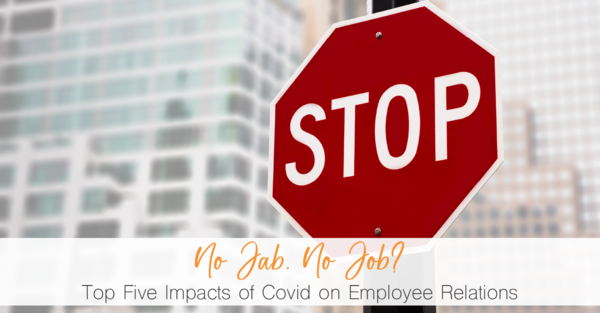Drop off your CV
We serve the global HR community through our offices located in Delhi, Hong Kong, London, New York, São Paulo and Singapore and have placed HR leaders in over 30 countries.
Written by our partners at ViewHR On 19th July 2021, the government lifted legal Coronavirus...

Written by our partners at ViewHR On 19th July 2021, the government lifted legal Coronavirus restrictions on social contact in England[1]. This included an end to the requirement for employees to work from home where possible. However, this does not necessarily mean that for employers, everything will automatically return to how it was before March 2020. The past 18 months have had a number of impacts on employee relations, and in this blog, we will explore five of the biggest factors that we believe will continue to impact employers going forward:
1. Flexible & Hybrid Working When government restrictions were introduced requiring people to work from home where possible, this will have been a first experience for many. For some people it was challenging, for a range of reasons such as lack of informal learning opportunities from colleagues, lack of social interaction, an unsuitable working environment at home, etc. However, for others, freed from the grind of the daily commute, it was liberating. Ultimately, employers have had to navigate some polar-opposite experiences and reactions by employees to the workplace changes. As a result of this, many employers now face a challenge to ensure that their policies going forward meet the needs of the business and support employee wellbeing. Some employers have identified that a full return to the workplace is required, but many others are implementing hybrid working policies, to set minimum expectations about when people need to be in, and when they can choose is most appropriate. Even if an employer does not have a hybrid working policy, employees can take advantage of their right to submit a flexible working request for consideration, provided they have worked for their employer for over 26 weeks[2].
2 . Health & Safety In recent months Health & Safety and HR have been particularly closely linked. For employees not able to work from home throughout the pandemic, and for those returning to the workplace now, clear communication about and implementation of Covid-safe measures has been key to ensuring people feel confident to undertake their roles. Feeling ‘safe’ at work is important for overall employee wellbeing and satisfaction, as well as for reducing individual grievances.
3. No Jab, No Job Media coverage of a controversial announcement by Pimlico Plumbers that they intended to introduce a “No Jab, No Job” policy[3] has led to much debate. Transport Secretary Grant Shapps described this as a “good idea” for employers[4], but there are a range of considerations under the Equality Act 2010, including for people who have severe allergies, health conditions which make the vaccine unsuitable, or certain religious beliefs. These people may have a protected characteristic, which offers them legal protections, and as such employers are encouraged to take careful legal advice and understand people’s individual concerns before taking action. Aside from the ‘no jab, no job’ element, there is also the divide amongst people who are vaccinated and not vaccinated. This in itself is beginning to feed grievances in the workplace.
4. ‘Us and Them’ Culture In 2020, reports[5] highlighted that divisions within some workplaces had begun to emerge, with employees who have taken on extra work during lockdown resenting their counterparts who have been on furlough leave. Similar divisions were also seen in workplaces where some employees were able to work from home, but others were not. Going forward, whilst furlough leave is nearly at an end, there may well be divisions between those able to work from home and those not. As such, employers may find it beneficial to focus on developing clear communication strategies for a hybrid workforce, and have a clear rationale for the requirements that apply to each role (e.g. “We need you in the office on this day because…”).
5. Employment tribunals At the start of the Coronavirus pandemic, it was a time of great uncertainty, and many employers found themselves having to make quick decisions in the face of a dramatically shifting business landscape, with no precedents to rely on. With long waits for employment tribunal currently, few cases relating to this time have filtered through yet. However, the case of Katun v. Winn Solicitors Ltd[6] was heard in March 2021and gives an indication of how the courts may interpret an employer’s actions. Ms Khatun was not placed on furlough leave as some of her colleagues were, but continued to work. She was nonetheless told that she needed to sign a non-negotiable contract variation to give the firm the freedom to place her on furlough or to unilaterally reduce her hours and pay by up to 20%, on five days' notice. When Ms Katun objected, she was dismissed. The employment tribunal found that the company had "sound, good business reasons" for implementing the contractual variation, and was not premature in wanting to implement this given the effects of the pandemic on business.
However, because the employer had not consulted with the employee (merely told her that it was non-negotiable)and had not reasonably considered alternatives (when the employee had said they would be open to discussing a contract variation in the future if furlough leave became applicable), then the dismissal decision was found to be unfair. [1] https://www.bbc.co.uk/news/uk-57809691 [2] https://www.gov.uk/flexible-working/applying-for-flexible-working [3] https://www.reuters.com/world/uk/no-jab-no-job-uk-plumbing-firm-exploring-vaccine-rules-staff-2021-01-14/ [4] https://www.theguardian.com/world/2021/jul/30/minister-insisting-staff-get-covid-jab-good-idea-despite-legal-risk?CMP=Share_AndroidApp_Other [5] https://www.telegraph.co.uk/news/2020/08/03/workers-have-go-office-resent-staying-home-experts-say/ [6] https://www.gov.uk/employment-tribunal-decisions/ms-a-khatun-v-winn-solicitors-ltd-2501492-slash-2020 If you would like any advice on handling the employee relations impacts of the Coronavirus pandemic, please get in touch with a member of the ViewHR team today for an initial discussion: hr@viewhr.co.uk | +44(0)1425 205390 | viewhr.co.uk.
ViewHR are UK based and provide flexible HR support and guidance combined with employment law consultancy.